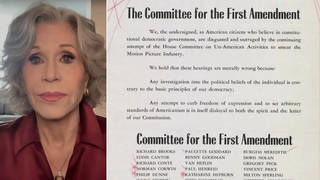
Topics
Guests
- Shulamit Alonileading Israeli civil rights activist and former Knesset member who headed the Meretz party.
Palestinian leader Marwan Barghouti appeared in Israeli court today on murder and terrorism charges. Before the trial began, Barghouti held his handcuffed hands in the air and shouted to reporters in Hebrew, English and Arabic: “Peace will be achieved by the end of the occupation. No peace, no security.” We speak with Shulamit Aloni, former Knesset member who headed the Meretz party.
Transcript
AMY GOODMAN: Israel put Marwan Barghouti, one of the top leaders of the Palestinian uprising, on trial today, they say, over the killings of scores of Israelis in a revolt which the handcuffed prisoner vowed would be victorious. A defiant Barghouti shouted in Hebrew at reporters who packed a Tel Aviv district courtroom, as well as in English, at the start of Israel’s first civilian trial of a major player in the nearly two-year-old uprising for independence. He said, “The intifada will win.”
Israel was expected to use the proceedings against the charismatic leader of Yasser Arafat’s Fatah faction in the West Bank as a showcase for allegations that groups linked to the Palestinian president are tainted by terrorism. Barghouti said he is innocent and that he was not asked to enter a formal plea during the 15-minute inaugural session. His lawyers argue that Israeli courts have no authority to try their client, a member of the Palestinian Legislature. Barghouti was captured by Israeli forces in the West Bank in April. He says he’s a political leader, not involved with violence. He could face life in prison, if convicted of murder.
Striking the first blow in what his lawyer has said would be an Israeli show trial, Barghouti, holding his handcuffed wrists in the air and surrounded by Israeli police, shouted in Hebrew, English and Arabic. He said, “Peace will be achieved by the end of the occupation. No peace, no security with the occupation.” He asked, “When can I speak? When can I speak?”
We are joined right now by Shulamit Aloni. She is in our firehouse studio. She is a former member of the Knesset, former head of the Meretz party. She has long been an outspoken opponent of the Sharon government.
Welcome to Democracy Now!
SHULAMIT ALONI: Thank you.
AMY GOODMAN: I want to start off by asking you what your comments are on this trial of Marwan Barghouti and what you think he represents.
SHULAMIT ALONI: I accept every word he said. Every word he said, I accept. The funny thing is, or the sad thing is, that we had in the past the same picture. When the Israelis, then under the British government, fought for our freedom and for our self-determination, they used the same tricks to bring people to jail. And on the other hand, the speech was the same speech: We want our freedom. And as long as we won’t get our self-determination and sovereignty, we’ll have to fight, and at last peace will win. So, exactly the same speech.
But what happens is that we use the British colonial laws even in a more barbaric way against the Palestinians. First of all, the British were not occupiers, because they got the mandate from the League of Nations. Second, they behaved differently. And we, being occupiers and oppressing the Palestinians, step by step, we do the terrible things one cannot imagine, by using the British colonial emergency law. For instance, the destruction of houses, the collective punishment and other things are according to the British emergency law from 1945, which we adopted.
AMY GOODMAN: Yours is a voice of criticism we don’t often hear in the United States. Often when there is dissent expressed in the United States against policies of the Israeli government, people here are called antisemitic. What is your response to that as an Israeli Jew?
SHULAMIT ALONI: Well, it’s a trick. We always use it. When from Europe somebody is criticizing Israel, then we bring up the Holocaust. When in this country people are criticizing Israel, then they are antisemitic. And the organization is strong and has a lot of money, and the ties between Israel and the American Jewish establishment are very strong. And they are strong in this country, as you know. They have power, which — it’s OK. They are talented people, and they have power, money and media and other things. And their attitude is: Israel, my country, right or wrong, the identification. And they are not ready to hear criticism. And it’s very easy to blame people who criticize certain acts of the Israeli government as antisemitic and to bring up the Holocaust and the suffering of the Jewish people. And that justify everything we do to the Palestinians.
AMY GOODMAN: How powerful are groups like the American Israel Political Affairs Committee, AIPAC, the Presidents of Jewish Organizations — Major Jewish Organizations in the United States? That’s another major establishment Jewish organization. How powerful are they in determining policy in Israel?
SHULAMIT ALONI: They are powerful because they serve the right wing of Israeli policy and because they are backed strongly by the government of the United States. If your administration wouldn’t — and not only administration, but the Congress, as well — wouldn’t back those two organizations, then they wouldn’t be as strong as they are, because they don’t represent the majority of the Jewish people in this country. There are many who say, “Not in my name. Not in my name. What you are doing, what you are saying, it’s not in my way — my name.” But they are not organized. They don’t have the money. They don’t have the power. They don’t — they were not accepted by the American establishment, political establishment. And that’s why you hear mainly their voice. And their voice is very strong.
AMY GOODMAN: Again, we’re speaking with Shulamit Aloni, who has often been referred to in Israel as the “first lady of human rights.” She was the head of the Meretz party until her retirement from the Knesset. She received the Israel Prize for Human Rights. You have been quoted as saying, “The occupation is killing us all.”
SHULAMIT ALONI: Yeah, that’s right. It’s killing the Palestinians, and it’s a disaster to the Israelis, because, first of all, morally speaking, you know, when we established the state of Israel — and I was one of those in the Palmach and fighting for establishing this state during the War of Independence — we were sure that we are building a model state, a moral state. So, when we were weak, we used to speak so highly of the Jewish values, and your people here also speak so highly of the Jewish values. And the Jewish values don’t include discrimination against the other and the kind of oppressing of the other and to take away their rights. And that’s what we have.
We deal with the Israeli Arabs as second-rate human beings. We deal with the Palestinians under our oppression and suppression. And you can use every word, because we change every town and every village into a camp of — kind of a camp — I don’t want to use the words, because it might remind, you know, different other camps. But people cannot go out, and you have curfew there. And they cannot go to work. They cannot get to a hospital. They cannot go to schools. They cannot — they are hungry. They have to stay at home. They don’t have air condition. Sometimes they don’t have electricity. They are short of drinking water — not of water, of drinking water — while they see the settlers next to them having the swimming pools, having the lawns in their land, on their land.
So, we have a real problem. It’s killing us morally, and it’s killing us economically, as well, because in Israel we have tremendous, big number of unemployment, of poverty, of backward people, education — low education in the developing places, the townlets in the north and in the south. And the money goes to the settlers, because they get free land. The government gives them a tremendous amount of money. Sharon was the person — before he became the prime minister, he was the minister of agriculture, minister of other — minister of defense. He was a minister during the war in Lebanon. He was a minister of trade.
AMY GOODMAN: And he was thrown out because of presiding over —
SHULAMIT ALONI: Yeah.
AMY GOODMAN: — the massacres at Sabra and Shatila.
SHULAMIT ALONI: Yeah, and no one understands why he became such a hero, and your prime minister says that he is a man of peace.
AMY GOODMAN: What do you think has to happen?
SHULAMIT ALONI: What has to happen? If there won’t be — why I say that I agree with every word was said by Barghouti, because as long as the occupation is there, there won’t be peace. As long as the occupation is there, they will fight. And I don’t believe that Sharon and his people and the zealots can deport 3 million people or to make them slaves, as some of them suggested. And unfortunately, your government didn’t prepare its homework, and they — many things they don’t know, as the minister or the secretary of defense in your country say that the occupation is not occupation; there was a war, so we have the right to take the land, the property — the land. He should have read the international laws and conventions, who say that you cannot by power annex land which — or put settlements there. And —
AMY GOODMAN: We have 10 seconds.
SHULAMIT ALONI: You have 10 seconds? The only thing is when your government will understand that the only backing they have to give to the conflict in Israel is to stop the occupation, to stop the settlers, to tell Mr. Sharon to stop the crimes against humanity and against human individuals, and to stop taking away citizenship from people, which is a criminal thing to do.
AMY GOODMAN: Shulamit Aloni —
SHULAMIT ALONI: And more of this.
AMY GOODMAN: I want to thank you very much for being with us, former head of the Meretz party, a former member of the Israeli Knesset. That does it for the program. Democracy Now! produced by Kris Abrams, Miranda Kennedy, Jeremy Scahill, Dexter X. Special thanks to Rosalie Hoffman. I’m Amy Goodman. Thanks for listening.












Media Options